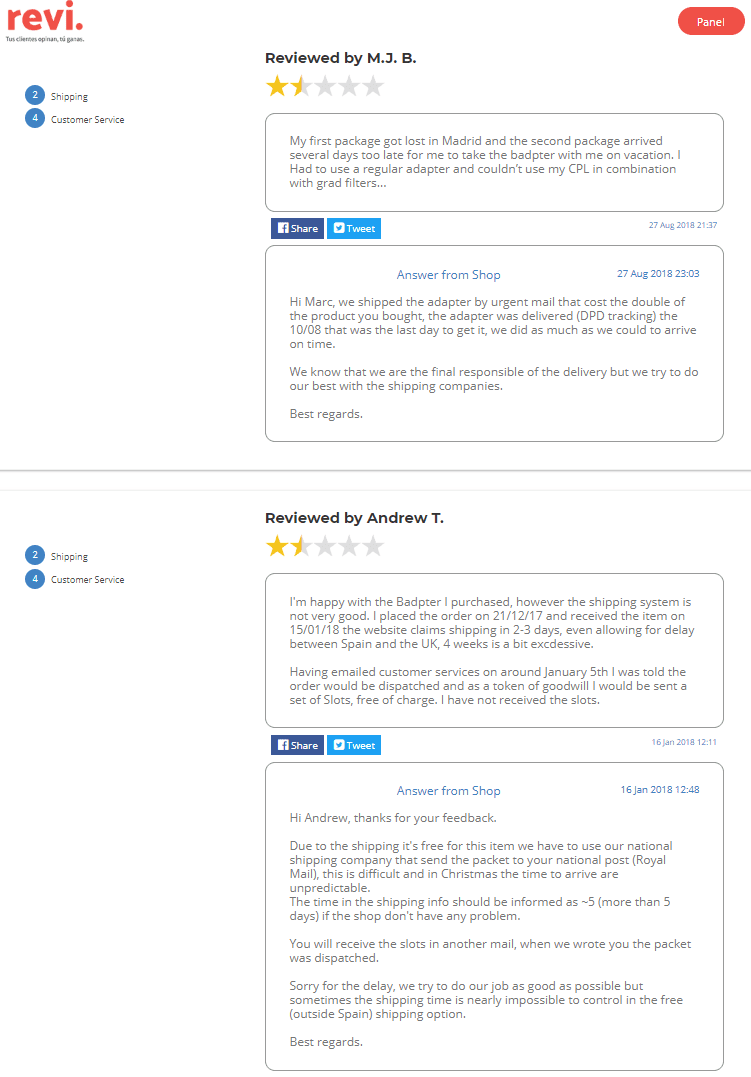Customer reviews are such a crucial part of the buying process that companies have invested a lot of money in trying to get their customers to write a review as part of their online marketing strategy
Research shows that the majority of online customers seek-out, read and take into consideration clients’ opinions, before buying.
Nowadays, there are reviews everywhere, from Airbnb to Uber, Amazon or any other online shop. Customer reviews are such a crucial part of the buying process that companies have invested a lot of money in trying to get their customers to write a review as part of their online marketing strategy.
Download our Premium Resource – Content Marketing Strategy E-learning course
Use our course to step through the analysis, planning and implementation activities which will take your content marketing to the next level.
Access the Content marketing strategy e-learning course
Encouraging customers to share their opinions has a lot of benefits, including:
- Build reliability
- Provide extra information about products or services
- Help speed up the purchasing process
- Improved SEO
- Better click through rate (CTR)
- Encourages a potential purchase
- User-generated content (UGC)
- Provides valuable information about customer satisfaction

With this array of reviews, collecting them quickly becomes a complicated task. Therefore, some companies have resorted to helping out with facilitating the buying process. This has worked great, until now.
Recently Amazon announced that they were going to establish new rules around incentivized clients’ opinions. This will put a break on a strategy, which is used by many online sellers. Nonetheless, experts warn that they also have their limitations, as too many good reviews can actually hurt your business more than help it.
There is no doubt that clients’ opinions will have a great impact on the buying decision, but they have to be presented in a natural and organic way. The key is to understand the science behind how reviews are seen by potential customers.
The psychology of the clients’ opinions
The social proof is a psychological concept, which describes how people discern what is correct through reference to what other people think is.
In the case of commerce and trade, the social proof reflects the idea of social influence: the actions from others affect the actions of a potential customer.
Word of mouth marketing is a great example of social proof in action. When we hear good things from family and friends about a business or restaurant, we think that it is socially acceptable or worth it to visit that place.
Another big aspect is when we see a queue at a restaurant, we think that the product is good. But watch out, if the queue gets too long, the impression changes to that of the service being slow.
Online reviews push this concept of the social proof to a maximum. Websites like Amazon, eBay, TripAdvisor and many more, allow consumers to read thousands of reviews, which help them when it comes to making a buying decision. Clients’ opinions are very precious, as they can answer user questions and, in those cases, the real value is social.
When things go well
When thousands of people give five-star reviews to a product or service the product gains social acceptance. The proof is in the numbers: according to BrightLocal, 68% of US consumers in 2017 said that positive reviews made them more likely to choose a company. Today, the numbers are probably even extreme.

Clients’ opinions have drastically changed certain industries, especially those in travel. In addition, B2B firms are notably affected. The 2014 State of B2B Procurement study found that 94% of customers of B2B companies consult online reviews before buying or signing a contract.
Online reviews are so powerful that they are more reliable than the recommendations of friends and family, precisely because they are anonymous and supposedly organic. In general, 84% of people trust online reviews nearly as much as they trust recommendations from family and friends.
Online reviews are especially important to affluent and rich travellers. According to a survey, rich travellers (those with an annual income of over $150,000) are nearly always valuing online reviews on sites like TripAdvisor higher than recommendations from family and friends. Only 37% said that the opinion of family and friends influenced them, which is 11% less than in the previous year.

When things go wrong
Even when there are negative reviews, promoting opinions can be a great strategy in digital marketing for different brands. Every review serves as a mini-history, a testimonial to what the customers liked about the product or service. Big review examinations can be part of the company strategy and be used in marketing, for example, email campaigns.
Getting customers to write a review, however, is a difficult task. Amazon has based their business model on reviews, and a positive review can be the difference for a retailer.
This review fever, however, comes with the possibility of fake reviews – something that Amazon is working hard on eradicating. Incentive reviews are when the user gets discounts or free samples in return for a positive review.
Getting rid of this type of review makes sense for Amazon, even though it may scare off some of their retailers. If there is no deviation in the reviews, it is very suspicious to the potential customer. This includes the opinions from incentivized reviews, both of these aspects reduce trust.
If all of the positive reviews are from users who got free samples, then the reviews themselves are questionable, leading potential customers to question whether it is worth paying for a product if no if none of the reviewers have.

Investigations show that if there is a review section that is too positive, it may impact small retailers negatively, as it can make potential customers question whether the reviews are legitimate. An opinion section that is too positive might also raise customer expectations to such a high level that they end up being disappointed by the product received.
The most effective opinion sections are those that show a mix of positive and negative reviews.
Encourage real reviews
Brands naturally motivate their fans and advocates to write reviews, which can lead to informing and educated reviews, showing the potential customers other people's experiences.
Every small review is a part of the grand marketing and content strategy. Like with all content, the authenticity of reviews - even if there are negative aspects included - can be more valuable than over-the-top 5-star reviews, which seem to be artificial or false.
There are many ways in which companies can get reviews without any tricks. First of all, they have the possibility to do it the old-fashioned way, by just asking the customers to help the company improve by leaving a review, but from there onwards the ideas are plenty.
In online stores, the retailers can use reminder emails for encouraging the writing of reviews. You yourself have probably received emails asking for your opinion. They try to remind you that your voice is important to the business and future customers.
The user experience can also help stimulate opinions. The companies (as well as external review sites) have to make sure that the process of giving a review is going to be as quick and easy as possible, especially for mobile devices.

User opinions have become indispensable from online shopping for the majority of online customers. But like in other online areas, a good quality review cannot be falsified and customers will recognize false reviews from a mile away. Retailers need to build relationships with their customers, were they become loyal and will want to give reviews online and offline.
Lina Pedelini is a Social Communicator and Digital Marketing specialist. Lina is responsible for content creation and introducing
revi.io to the UK market to help businesses harness the power of client reviews to drastically increase sales. If you want to find out how you can work with Lina and her team, you can reach her directly at
[email protected].












